Category: "faith/skepticism"
Church and State Reprised
Several of my Facebook friends have been joining the cause Keep God in Schools. Back when I was a pastor, I wrote an article for the church newsletter about the separation of church and state. My view today is very similar to my view then. Separation of church and state is good for the church and good for the state. I would love to discuss this with anyone who disagrees. My first question: Which denomination's understanding of God should be taught in our schools?
A Film About Homosexuality and Christianity
 Is it possible to be a devoted Christian and an openly gay person? How do Christian families deal with the news that their child is gay when their church tells them that homosexuality is an abomination? These are some of the questions tackled in the documentary For The Bible Tells Me So. This award-winning film tells the stories of several families and how they were able to make peace between their religious beliefs and their love for their children. There are also interviews with religious scholars on both sides of the issue. Many scholars believe that the Bible, when interpreted correctly, does not condemn homosexual relationships.
Is it possible to be a devoted Christian and an openly gay person? How do Christian families deal with the news that their child is gay when their church tells them that homosexuality is an abomination? These are some of the questions tackled in the documentary For The Bible Tells Me So. This award-winning film tells the stories of several families and how they were able to make peace between their religious beliefs and their love for their children. There are also interviews with religious scholars on both sides of the issue. Many scholars believe that the Bible, when interpreted correctly, does not condemn homosexual relationships.
The film is heartwarming and instructive. Although you hear from some Christian leaders who maintain that homosexuality is wrong and some that don't, in the end it's clear that the filmmaker sides with those who are more accepting. He shows the healing that comes to families who love and accept their gay children unconditionally. He also shows one family that was torn apart permanently because this religious belief came between a mother and a daughter.
Here's a trailer for the movie:
[youtube]HpJAucyX7RE[/youtube]
Here's a clip showing a little cartoon from the movie about whether homosexuality is a choice:
[youtube]BKExZKfgx9s[/youtube]
Millions of Christians and thousands of churches already welcome gay members. In my neck of the woods, churches are not so forward thinking. Many still believe that gay people must try to change their orientation by prayer and sheer force of will or that they must be celibate for the rest of their lives. I hope people watch this film and learn that there is a better way.
An update to my religious autobiography
I recently ran across a book that played a significant role in one phase of my life, so I've updated my religious autobiography by adding this paragraph:
Over the next few years I had many discussions with family and friends about my shift in beliefs. For some of them, my decision to go to a church that worshiped with instruments was almost as bad as abandoning God altogether. (This fact would prepare me and them for the bigger shift that I would go through a few years later.) One of the books that helped me cope with this situation was Free In Christ by Cecil Hook. The book is available for free online or you can order a print copy. Hook never left the coC, but he spoke persuasively against the legalism and division that is so prevalent in many churches of Christ. I recommend the book to anyone in the church who wants to see things from another prospective and anyone outside the church who wants to see what makes this little non-denominational denomination tick.
Twain on Irreverence
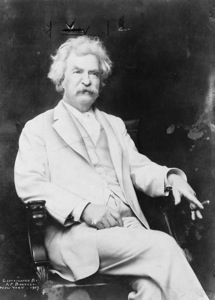
"Irreverence is another person's disrespect to your god; there isn't any word that tells what your disrespect to his god is."
-- Mark Twain
Book Review: 50 Reasons People Give for Believing in a God
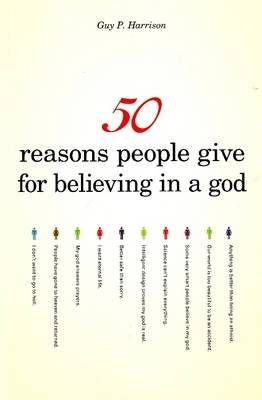 I've read several books about atheism, but my most enthusiastic recommendation to date goes to Guy Harrison's 50 Reasons People Give for Believing in a God. This book doesn't narrate the author's loss of faith like Dan Barker's books, nor is it a provocative and artful attack against Christian belief like The God Delusion by Richard Dawkins, nor yet is it a scientific examination of religion as a natural phenomenon like Dan Dennett's Breaking the Spell. I recommend this book to believers and nonbelievers alike because it is a straightforward and respectful evaluation of the reasons that normal people (not theologians) give for believing in a god.
I've read several books about atheism, but my most enthusiastic recommendation to date goes to Guy Harrison's 50 Reasons People Give for Believing in a God. This book doesn't narrate the author's loss of faith like Dan Barker's books, nor is it a provocative and artful attack against Christian belief like The God Delusion by Richard Dawkins, nor yet is it a scientific examination of religion as a natural phenomenon like Dan Dennett's Breaking the Spell. I recommend this book to believers and nonbelievers alike because it is a straightforward and respectful evaluation of the reasons that normal people (not theologians) give for believing in a god.
The book is organized into 50 stand-alone chapters that average about 7 pages each. I read the book cover to cover, but you could skip around to the chapters that interest you the most. If you believe in your god because he answers prayers, then jump right to chapter 14 and read the author's response to that reason. This organization makes the book very approachable.
One of the things that sets this book apart is that it does not focus on Christian belief exclusively. Very often, the debate is between belief in Yahweh and belief in no god at all. That makes the Christian's task seem easier than it really is. Harrison points out that the Christian God is only one of thousands of gods and goddesses. Throughout the book he spells "god" with a lowercase g and gives examples from several world religions. He doesn't attack any one religion, but shows that they make similar claims for many of the same reasons and all share a lack of evidence. The assertion that Yahweh has impacted a person's life loses most of its force when we're reminded that people say that their lives are impacted in the same ways by Allah, Ganesha, Isis and ancestral spirits.
The best thing about this book is its tone. Harrison is uncompromising in his skepticism, but he never stoops to mockery. He acknowledges the benefits of faith and religious community. He shares experiences of being moved by music and rituals from various traditions. He pays respect to the important role that religion has played in the history, culture and personal lives of believers. He simply points out that there's no evidence that any of these gods exist and there are often simpler explanations. Believers can read this book without being belittled or offended.
But why would a believer want to read what an atheist has to say about faith? I think it's good to understand both sides of important issues. That's why I've read several books by Christians since I've become an atheist. Perhaps I'll learn something I didn't know and reconvert. Or perhaps I'll better understand why people believe and that will help me to appreciate them (and debate with them). Believers should understand nonbelievers for the same reasons. It will help you understand that we have reasons for not believing. It will help you examine the roots of your own belief, which may strengthen your faith. You'll be more equipped for debating with atheists, too.
You can buy the book from Amazon here or do like I did and check it out from the library. Guy Harrison was interviewed about the book on the Point of Inquiry podcast.
Sara speaks
There have been over 600 comments on Sara's 4.5 year old Worst Worship Songs post. For the first time in a while, she responded to the commenters.
Atheists Are People Too
Discrimination against atheists is one of the last types of socially acceptable discrimination. It comes in many forms, the most shocking of which is legal: Some state constitutions attempt to strip atheists of their legal rights. Before I go any further, I would like to make a disclaimer. Though I think discrimination against atheists is real and runs counter to the spirit of our nation, it is nothing compared to what is been faced by black Americans, gay Americans or female Americans at various times in our country's history. It's also different because we choose it (unlike race, gender and sexual orientation) and we choose how public to make it. If I wanted to, I could present myself as a nominal Christian or I could choose to not discuss religion at all. But if a person decides that they don't believe in any invisible, undetectable deities and they make this unbelief known, they will find that they are often the odd man out.
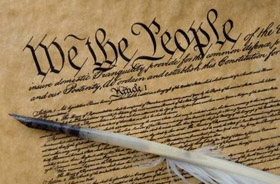 Although the U.S. Constitution forbids religious tests for any federal office in Article VI, section 3, several state constitutions create just such a test. The following states require belief in God to serve in public office: Arkansas, North Carolina, South Carolina, Tennessee, Texas, Maryland and Pennsylvania. Two states (Arkansas and Maryland) require belief in God in order to testify as a witness in court. Fortunately, the U.S. Supreme Court ruled in 1961 (Torcasa v. Watkins) that all of those tests are unconstitutional, but the laws mentioned above are still on the books.
Although the U.S. Constitution forbids religious tests for any federal office in Article VI, section 3, several state constitutions create just such a test. The following states require belief in God to serve in public office: Arkansas, North Carolina, South Carolina, Tennessee, Texas, Maryland and Pennsylvania. Two states (Arkansas and Maryland) require belief in God in order to testify as a witness in court. Fortunately, the U.S. Supreme Court ruled in 1961 (Torcasa v. Watkins) that all of those tests are unconstitutional, but the laws mentioned above are still on the books.
In the minds of many voters, there remains a de facto religious test for public office. Several studies have found that, all other things being equal, voters are less likely to vote for an atheist candidate than (in order) a homosexual, 72-year-old, thrice married, Mormon, Hispanic, female, Jewish, black or Catholic (Gallup). In that study, atheists were the only group that more than 50% of the respondents wouldn't vote for. This study was one of the reasons that I ended up not running for state representative when I was asked this spring.
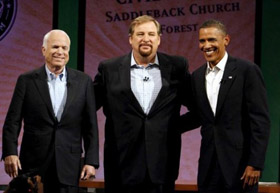 Where are people getting the idea that a person is unfit for public office just because they don't believe in an ancient tribal god? How about their pastors, a President and the Bible. Pastor Rick Warren, days after hosting both presidential candidates at his church, said he would never vote for an atheist. George H.W. Bush (41) said that he didn't think atheists should be considered citizens. The Bible says that people who deny that Jesus is Christ are antichrists. I doubt that many Christians who believe in the Bible would vote for a person who they consider to be an antichrist.
Where are people getting the idea that a person is unfit for public office just because they don't believe in an ancient tribal god? How about their pastors, a President and the Bible. Pastor Rick Warren, days after hosting both presidential candidates at his church, said he would never vote for an atheist. George H.W. Bush (41) said that he didn't think atheists should be considered citizens. The Bible says that people who deny that Jesus is Christ are antichrists. I doubt that many Christians who believe in the Bible would vote for a person who they consider to be an antichrist.
It's not just in the political arena where atheists are at a disadvantage. When I started a new job this spring with a web development company my boss found my website and asked me to never link to the company site or any client sites because they might find out that an atheist is working for him. While I think it's sad that I can't link to projects that I'm proud of, I don't hold it against my boss. It's not his fault that he could lose business because of my beliefs. I might do the same thing if I was in his position. I only wish that non-belief didn't turn a person into a pariah.
I've also found that some from my old church are no longer interested in being my friend and they don't return my emails. I'm sure I share part of the blame for that because I've been so vocal about my loss of faith and the problems I see in religion. Perhaps if I kept quiet about it they wouldn't shun me. But I've heard many of these people say that atheists are going to be tortured for eternity in Hell, so I'm not the only one criticizing. I do regret some of the things I've said about religious people and I intend to be more considerate in the future. I will continue to discuss religion, but I'll try focus my attacks on ideas, not people.
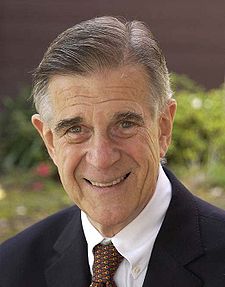 There are signs that things are getting better. While the world celebrated the election of Barack Obama as the nation's first African-American President, another milestone was quietly reached out west. Pete Stark of California became the first openly atheist person to be elected to the U.S. Congress. There have already been female, black, gay, Jewish and Muslim people elected to Congress. Another bright spot was in North Carolina where incumbent Republican Elizabeth Dole attacked challenger Kay Hagan for associating with atheists. Dole's attack fell flat and she lost, in part because Hagan returned fire, calling Dole a liar and affirming the fact that she is a Christian. I'd like to think that Hagan also won because voters rejected the idea that atheism is evil, but I'm not too sure.
There are signs that things are getting better. While the world celebrated the election of Barack Obama as the nation's first African-American President, another milestone was quietly reached out west. Pete Stark of California became the first openly atheist person to be elected to the U.S. Congress. There have already been female, black, gay, Jewish and Muslim people elected to Congress. Another bright spot was in North Carolina where incumbent Republican Elizabeth Dole attacked challenger Kay Hagan for associating with atheists. Dole's attack fell flat and she lost, in part because Hagan returned fire, calling Dole a liar and affirming the fact that she is a Christian. I'd like to think that Hagan also won because voters rejected the idea that atheism is evil, but I'm not too sure.
If you are a non-religious person, what has your experience been? Do you keep it quiet? Has it affected your relationships or career? Do you think things are getting better? What can we do to improve our status in this country?
The Message of Jesus
A friend asked me what I thought of the message of Jesus. Here's my response:
If Jesus had a single coherent message, it was "Repent, for the Kingdom of God/Heaven is at hand." Jesus (assuming he really said it) probably meant it just like all the other apocalyptic preachers of the time. He meant that God was going to restore the glorious kingdom in Jerusalem and right all the wrongs Israel had endured. He was dead wrong, of course, and things got worse for the Jews rather than better. Later Christians read different ideas into his words and we can probably assume they selectively passed on his sayings to support their revisionist interpretations. Now the Kingdom means the church or the second coming or heaven or something else. There's not even a consensus of what it means.
He spoke in riddles and parables and again there's still disagreement about what some of them mean. Seems like he could have taught more clearly if he really had something important to convey. That was his one chance at direct contact with humans. Pretty unimpressive.
Once you look past the kingdom talk and the unclear stuff, there are some good ideas. Pride and hypocrisy are bad, especially in religion. Forgiveness and peace. Sharing of wealth. Love. Reciprocity. Nothing groundbreaking or original, but certainly some ideas that any humanist (secular or otherwise) can appreciate.
But the core of his message was just wrong. There is no Kingdom.
Palin's Pastor Problem
Would Sarah Palin bring back witch hunts?
[youtube]n-_h2OU8RAQ[/youtube]
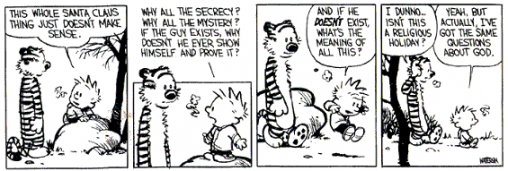
Recent comments